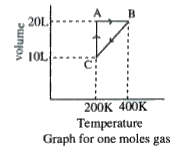Which of the following is/are true in the case of an adiabatic processSolution in Telugu
q=W
ΔU=q
q= 0
ΔU=W
The correct Answer is:C, D
Adiabatic ⇒q=0⇒ΔU=W
Topper's Solved these Questions
- CHEMICAL THERMODYNAMICSBook:AAKASH SERIESChapter:CHEMICAL THERMODYNAMICSExercise:LECTURE SHEET (EXERCISE-I) (LEVEL - II (ADVANCED) LINKED COMPREHENSION TYPE QUESTIONS)
Explore 5 Videos
- CHEMICAL THERMODYNAMICSBook:AAKASH SERIESChapter:CHEMICAL THERMODYNAMICSExercise:LECTURE SHEET (EXERCISE-I) (LEVEL - II (ADVANCED) MATRIX MATCHING TYPE QUESTIONS)
Explore 1 Video
- CHEMICAL THERMODYNAMICSBook:AAKASH SERIESChapter:CHEMICAL THERMODYNAMICSExercise:LECTURE SHEET (EXERCISE-I) (LEVEL - II (ADVANCED) STRAIGHT OBJECTIVE TYPE QUESTIONS)
Explore 5 Videos
- CHEMICAL THERMODYANMICS Book:AAKASH SERIESChapter:CHEMICAL THERMODYANMICS Exercise:Questions For Descriptive Answers
Explore 28 Videos
- ELECTRON MIGRATION EFFECTS Book:AAKASH SERIESChapter:ELECTRON MIGRATION EFFECTS Exercise:QUESTIONS FOR DESCRIPTIVE ANSWERS
Explore 10 Videos
Similar Questions

Process A→B represents
View SolutionMatch the following columns

View SolutionWhich has maximum internal energy at 298K?
View SolutionHow does heat of neutralisation value change with the chemical nature of acid and base?
View SolutionHyperconjugation effect is also termed as 'no bond resonance'. Why?
View SolutionWhich of the following is true in the case of a reversible process?
View SolutionAssertion : An adiabatic process is an isoentropic process. Reason : Change in entropy is zero in case of adiabatic process
View SolutionWhich of the following is true in the case of an adiabatic process, where γ=CpCv?
View SolutionWhich of the following is true for reversible adiabatic process involving an ideal gas ?
View SolutionWhich of the following is true for an adiabatic process:
View SolutionWhich of the following is true for an adiabatic process
View SolutionIn an adiabatic process, which of the following is true ?
View SolutionIn an adiabatic process, which of the following is true ?
View SolutionWhich of the following is are true in the case of an adiabatic process(A)q=W, (B)ΔU=q, (C)q=0, (D)ΔU=W
View SolutionIn an adiabatic process which of the following is true?
View Solution

